East Cree dialects

There are two main dialects of Eastern James Bay Cree, northern and southern. Each dialect has its own spelling conventions. (The ISO 639-3 code is crl for Northern East Cree, and crj for Southern East Cree).
The communities where the northern dialect is spoken are Wemindji, Chisasibi and Whapmagoostui. The communities where the southern dialect is spoken are Waskaganish, Nemaska, Waswanipi, Ouje-Bougoumou and Mistissini. The community of Eastmain is in between northern and southern dialects, but has chosen to belong to the Southern dialect by adopting the southern writing system.
The southern dialect area can be further subdivided into the coastal and inland dialects. The southern communities on the coast are: Eastmain and Waskaganish. The inland communities are: Nemaska, Waswanipi, Ouje-Bougoumou and Mistissini.
A common misconception with respect to the division of East Cree is that the two dialects are Inland and Coastal, bundling together all the Coastal communities from Waskaganish to Whapmagoostui. This geographical distinction does not accurately characterize the Cree dialects; the northern and southern dialect distinction is the basic divide and within the southern dialects a further distinction can be made between coastal and inland, as explained above.
The following table shows a few of the differences in pronunciation between the various East Cree dialects (reflected in the different spellings).
| English | Southern Inland | Southern Coastal | Northern |
| man | naapeu | naapeu | naapaau |
| ᓈᐯᐤ | ᓈᐯᐤ | ᓈᐹᐤ | |
| Cree | iinuu | iyiyuu | iyiyiu |
| ᐄᓅ | ᐃᔨᔫ | ᐃᔨᔨᐤ | |
| net | ahapii | ahiipii | ahiipii |
| ᐊᐦᐊᐲ | ᐊᐦᐄᐲ | ᐊᐦᐄᐲ | |
| thing | chekwaan | chekwaan | chaakwaan |
| ᒉᒀᓐ | ᒉᒀᓐ | ᒑᒀᓐ | |
| on the side | napate | napate | nipitaa |
| ᓇᐸᑌ | ᓇᐸᑌ | ᓂᐱᑖ |
Note that the Northern dialect has the vowel ᐋ aa where the Southern one has the vowel ᐁ e, and that Northern usually has the vowel ᐃ i where Southern has the vowel ᐊ a. The coastal dialects (North and South) have y in some words when the inland dialects have n. There are also a few differences in spelling rules, such as writing ᐃᔨᔫ iyiyuu and ᐃᔨᔨᐤ iyiyiu, but they are minor.
Note: There is a habit of writing the word ᐃᔨᔨᐤ iyiyiu with a long ᐄ ii at the beginning. This spelling is used in the dictionary and printed texts. The spelling used here correctly reflects the word structure (iyi corresponds to ii in the Southern dialect).
 Grammar
Grammar